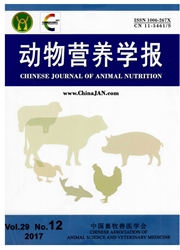

 中文摘要:
中文摘要:
Background: The intestinal epithelium is an important barrier that depends on a complex mixture of proteins and these proteins comprise different intercellular junctions. The purpose of this study was to investigate the postnatal and developmental changes in morphology, intercellular junctions and voltage-gated potassium(Kv) channels in the intestine of piglets during the suckling and post-weaning periods.Results: Samples of the small intestine were obtained from 1-, 7-, 14-, and 21-d-old suckling piglets and piglets on d 1, 3, 5, and 7 after weaning at 14 d of age. The results showed that the percentage of proliferating cell nuclear antigen(PCNA)-positive cells and alkaline phosphatase(AKP) activity, as well as the abundances of E-cadherin,occludin, and Kv1.5 m RNA and claudin-1, claudin-3, and occludin protein in the jejunum were increased from d 1to d 21 during the suckling period(P < 0.05). Weaning induced decreases in the percentage of PCNA-positive cells,AKP activity and the abundances of E-cadherin, occludin and zonula occludens(ZO)-1 m RNA or protein in the jejunum on d 1, 3 and 5 post-weaning(P < 0.05). There were lower abundances of E-cadherin, occludin and ZO-1m RNA as well as claudin-1, claudin-3 and ZO-1 protein in the jejunum of weanling piglets than in 21-d-old suckling piglets(P < 0.05). The abundances of E-cadherin, occludin, ZO-1 and integrin m RNA were positively related to the percentage of PCNA-positive cells.Conclusion: Weaning at 14 d of age induced damage to the intestinal morphology and barrier. While there was an adaptive restoration on d 7 post-weaning, the measured values did not return to the pre-weaning levels, which reflected the impairment of intercellular junctions and Kv channels.
 英文摘要:
英文摘要:
Background: The intestinal epithelium is an important barrier that depends on a complex mixture of proteins and these proteins comprise different intercellular junctions. The purpose of this study was to investigate the postnatal and developmental changes in morphology, intercellular junctions and voltage-gated potassium(Kv) channels in the intestine of piglets during the suckling and post-weaning periods.Results: Samples of the small intestine were obtained from 1-, 7-, 14-, and 21-d-old suckling piglets and piglets on d 1, 3, 5, and 7 after weaning at 14 d of age. The results showed that the percentage of proliferating cell nuclear antigen(PCNA)-positive cells and alkaline phosphatase(AKP) activity, as well as the abundances of E-cadherin,occludin, and Kv1.5 m RNA and claudin-1, claudin-3, and occludin protein in the jejunum were increased from d 1to d 21 during the suckling period(P 〈 0.05). Weaning induced decreases in the percentage of PCNA-positive cells,AKP activity and the abundances of E-cadherin, occludin and zonula occludens(ZO)-1 m RNA or protein in the jejunum on d 1, 3 and 5 post-weaning(P 〈 0.05). There were lower abundances of E-cadherin, occludin and ZO-1m RNA as well as claudin-1, claudin-3 and ZO-1 protein in the jejunum of weanling piglets than in 21-d-old suckling piglets(P 〈 0.05). The abundances of E-cadherin, occludin, ZO-1 and integrin m RNA were positively related to the percentage of PCNA-positive cells.Conclusion: Weaning at 14 d of age induced damage to the intestinal morphology and barrier. While there was an adaptive restoration on d 7 post-weaning, the measured values did not return to the pre-weaning levels, which reflected the impairment of intercellular junctions and Kv channels.
 同期刊论文项目
同期刊论文项目
 同项目期刊论文
同项目期刊论文
 期刊信息
期刊信息
